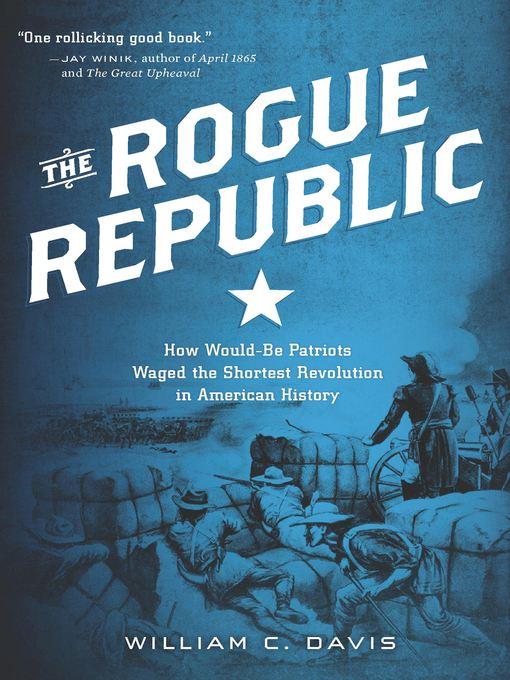
The Rogue Republic
How Would-Be Patriots Waged the Shortest Revolution in American History
کتاب های مرتبط
- اطلاعات
- نقد و بررسی
- دیدگاه کاربران
نقد و بررسی

February 7, 2011
Davis (The Pirates Laffite) presents a well-documented account of "America's second and smallest rebellion," led by a simple storekeeper named Reuben Kemper. The region of West Florida, settled increasingly by Americans after the Revolution, extended across what is now southern Alabama and Mississippi, and was controlled by Spain. Spain offered generous terms to settlers, who brought with them a shared culture preoccupied with law and order and insistent on individual rights. Their loyalty to Spain dwindled as it became less and less capable of providing an environment in which they could prosper morally or materially. As Spain fought for its existence against Napoleon, a local administration, left to its own devices, imposed increasing restrictions on immigration and land acquisitions. With civil and criminal law eroding, resistance emerged in 1810, creating a republic that, after 90 days, was absorbed by the United States. Davis tells this story with nuance and panache. This book exposes a nearly forgotten piece of America's history and character, when a desire for peace and stability, not manifest destiny, impelled a people to the shortest revolution in the nation's history.

Starred review from April 1, 2011
Davis (History/Virginia Tech; The Pirates Laffite: The Treacherous World of the Corsairs of the Gulf, 2005, etc.), presents a significant study of an obscure but highly revealing moment in American history—the declaration of independence by American settlers of the oft-disputed Territory of West Florida in 1804.
So much of the political conflict during the Federalist period involved territorial control. Nowhere was this more overt than the first American "Southwest," which at the time included what is now Louisiana, Texas, Alabama, Mississippi and the westernmost parts of Florida. The fluctuation of colonial ownership throughout the region reflected the larger geopolitics of European power struggles, even as the Louisiana Purchase should have settled any remaining disputes. Regardless of who controlled this vast wilderness, it was home to a pragmatic population of settlers, speculators and frontier opportunists, who lived equally comfortably live under Spanish, French or American jurisdiction—until it became uncomfortable. Thus was the case with the brothers Kemper—Nathan, Reuben and Samuel—who became involved in a failed business arrangement with an Ohio politician John Smith. When Smith ended his arrangement with the Kempers, whom he had hired to manage his mercantile endeavors in Spanish West Florida, a Spanish court ordered the surrendering of the Kemper property and their removal from the territory. The Kempers contemptuously defied the order, in part because they believed the finalization of the Louisiana Purchase would render the decision moot. A series of standoffs with militia eventually led to a full-on insurgency of American settlers against the Spanish rule, resulting in a very brief period of nationhood.
Not only does Davis cast a bright light into these murky corners of our national past, he does so with a grace and clarity equal to the best historical writing today.
(COPYRIGHT (2011) KIRKUS REVIEWS/NIELSEN BUSINESS MEDIA, INC. ALL RIGHTS RESERVED.)

February 1, 2011
Davis (history, Virginia Tech) tells the compelling story of a series of early 19th-century rebellions over sovereignty and the short-lived West Florida Republic of 1810. After the American Revolution, England ceded its Florida territories to Spain, which retained sovereignty even as massive adjacent lands became American after the Louisiana Purchase. Rabble-rousers such as Samuel and Reuben Kemper took advantage of the uncertain political, economic, and cultural climate that resulted from competing and multiple territorial transfers to lead violent but unsuccessful rebellions with questionable aims. Then a more organized and politically motivated, almost bloodless rebellion led to the establishment of an independent West Florida Republic that lasted fewer than three months, with President Madison stepping in and absorbing the region into America. VERDICT Well written and deeply researched as this is, further exploration into the intentions and actions of Presidents Jefferson and Madison and the larger context of American expansionism would have made for an even more comprehensive and important book. A dense and detailed work of scholarship, not for lay readers, but for students of the region's history.--Douglas King, Univ. of South Carolina Lib., Columbia
Copyright 2011 Library Journal, LLC Used with permission.

March 1, 2011
The Treaty of Paris, signed in 1783, guaranteed American independence but also left the area called West Florida under the control of Spain. Although the term manifest destiny would not be coined for several decades, American officials immediately cast covetous eyes on the territory. Encompassing parts of the future states of Louisiana, Mississippi, Alabama, and Florida, West Florida already contained thousands of American and British settlers, many of them slaveholders. Although Spanish rule was relatively benevolent, it did not prevent the rise of separatist sympathizers, including those who wanted an independent republic and those who expected union with the U.S. Davis teaches history at Virginia Tech and is also a consultant for the A&E series Civil War Journal. Here he recounts the brief but interesting chronicle of the events and men who triggered the uprising against Spain, the establishment of a short-lived republic, and rapid annexation by the U.S. This is a well-done recounting of an obscure but ultimately important episode in our history.(Reprinted with permission of Booklist, copyright 2011, American Library Association.)

























دیدگاه کاربران